Report on Sustainable and Responsible Tourism Management in Slovenia
VerifiedAdded on 2023/01/06
|14
|4611
|93
Report
AI Summary
This report delves into the concept of sustainable and responsible tourism, examining its evolution and the roles of key organizations like the UNWTO and World Travel & Tourism Council. Focusing on the Slovenian context, particularly the non-profit organization GoodPlace and the tourism destination Lenart, the report explores tourism development and planning principles, including sustainable resource use, community engagement, and responsible marketing. It analyzes the process of tourism development and planning, highlighting challenges and problems, while also investigating the economic, social, cultural, and environmental impacts of tourism in Lenart. Furthermore, the report examines how sustainability principles are implemented by specific tourism businesses and evaluates the development and management of sustainability in various tourist destinations worldwide, providing a comprehensive overview of sustainable tourism practices and their implications.
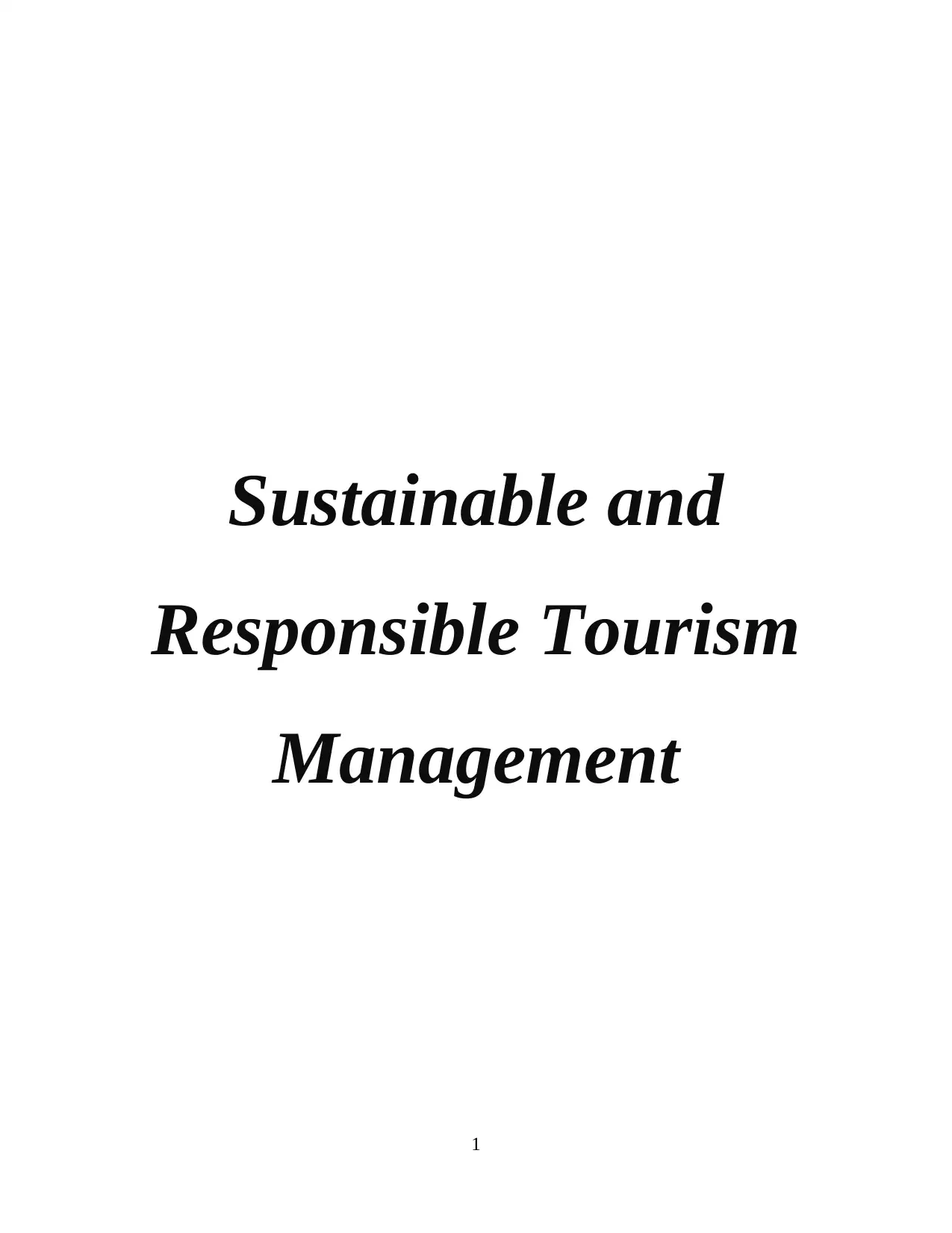
Sustainable and
Responsible Tourism
Management
1
Responsible Tourism
Management
1
Paraphrase This Document
Need a fresh take? Get an instant paraphrase of this document with our AI Paraphraser
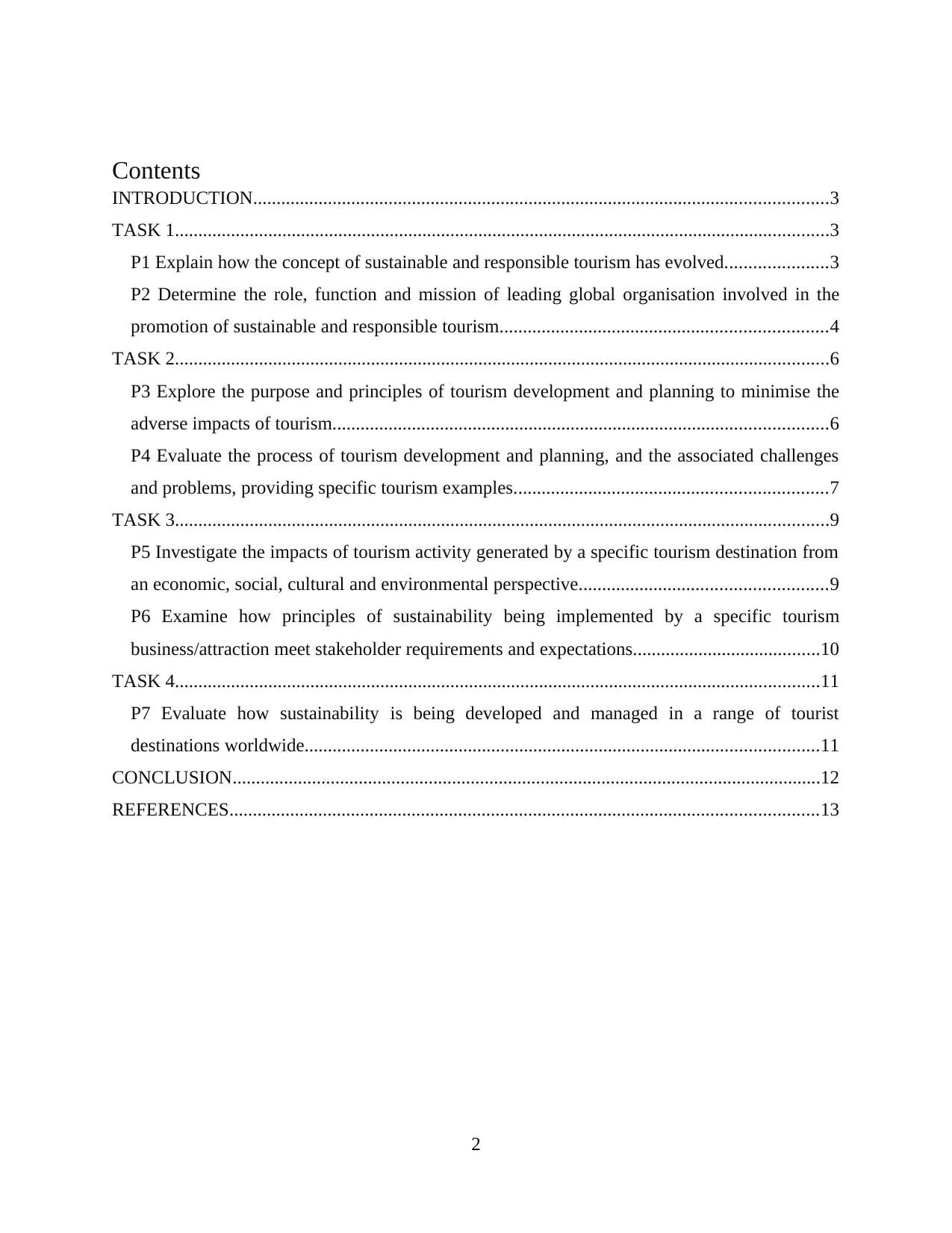
Contents
INTRODUCTION...........................................................................................................................3
TASK 1............................................................................................................................................3
P1 Explain how the concept of sustainable and responsible tourism has evolved......................3
P2 Determine the role, function and mission of leading global organisation involved in the
promotion of sustainable and responsible tourism......................................................................4
TASK 2............................................................................................................................................6
P3 Explore the purpose and principles of tourism development and planning to minimise the
adverse impacts of tourism..........................................................................................................6
P4 Evaluate the process of tourism development and planning, and the associated challenges
and problems, providing specific tourism examples...................................................................7
TASK 3............................................................................................................................................9
P5 Investigate the impacts of tourism activity generated by a specific tourism destination from
an economic, social, cultural and environmental perspective.....................................................9
P6 Examine how principles of sustainability being implemented by a specific tourism
business/attraction meet stakeholder requirements and expectations........................................10
TASK 4..........................................................................................................................................11
P7 Evaluate how sustainability is being developed and managed in a range of tourist
destinations worldwide..............................................................................................................11
CONCLUSION..............................................................................................................................12
REFERENCES..............................................................................................................................13
2
INTRODUCTION...........................................................................................................................3
TASK 1............................................................................................................................................3
P1 Explain how the concept of sustainable and responsible tourism has evolved......................3
P2 Determine the role, function and mission of leading global organisation involved in the
promotion of sustainable and responsible tourism......................................................................4
TASK 2............................................................................................................................................6
P3 Explore the purpose and principles of tourism development and planning to minimise the
adverse impacts of tourism..........................................................................................................6
P4 Evaluate the process of tourism development and planning, and the associated challenges
and problems, providing specific tourism examples...................................................................7
TASK 3............................................................................................................................................9
P5 Investigate the impacts of tourism activity generated by a specific tourism destination from
an economic, social, cultural and environmental perspective.....................................................9
P6 Examine how principles of sustainability being implemented by a specific tourism
business/attraction meet stakeholder requirements and expectations........................................10
TASK 4..........................................................................................................................................11
P7 Evaluate how sustainability is being developed and managed in a range of tourist
destinations worldwide..............................................................................................................11
CONCLUSION..............................................................................................................................12
REFERENCES..............................................................................................................................13
2
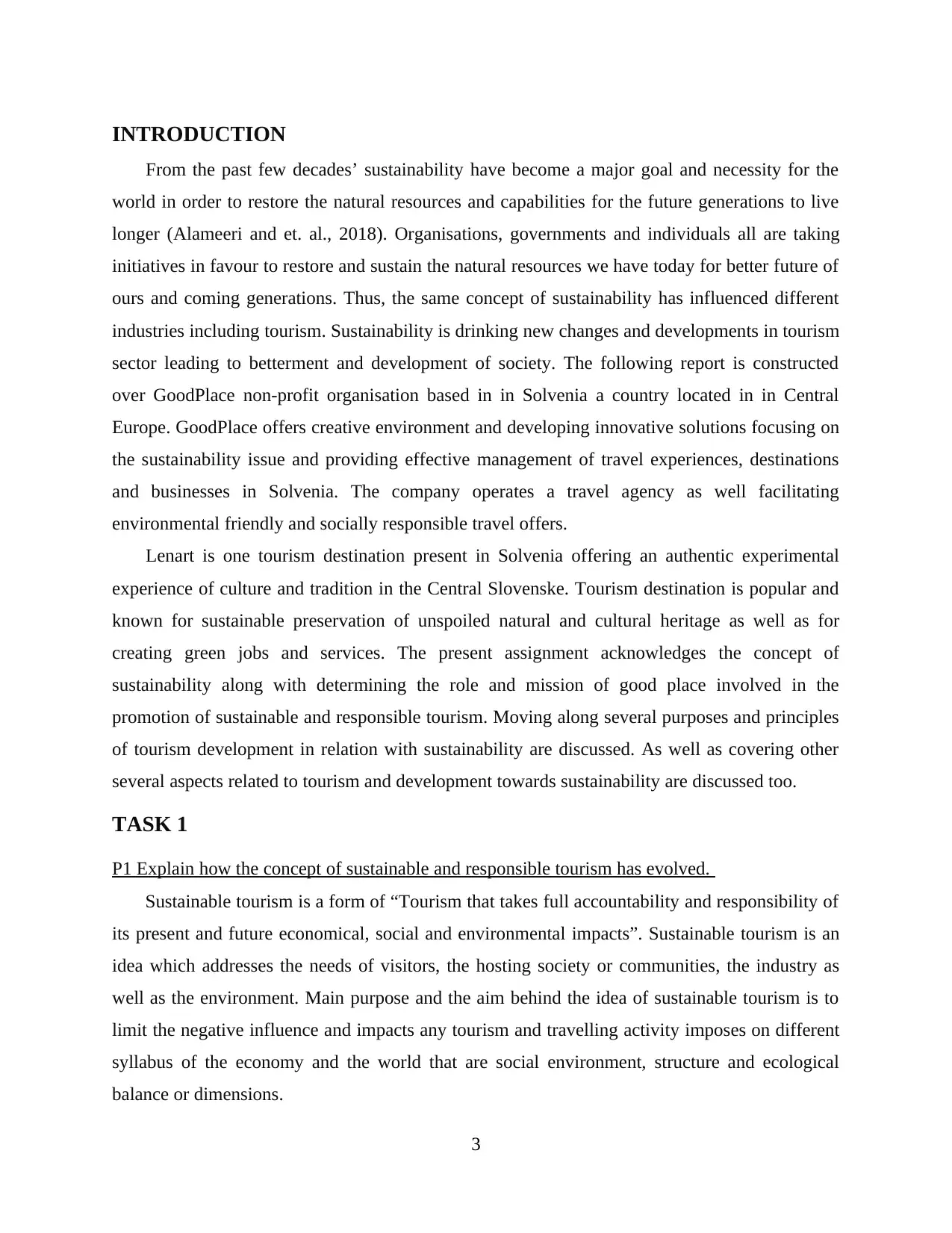
INTRODUCTION
From the past few decades’ sustainability have become a major goal and necessity for the
world in order to restore the natural resources and capabilities for the future generations to live
longer (Alameeri and et. al., 2018). Organisations, governments and individuals all are taking
initiatives in favour to restore and sustain the natural resources we have today for better future of
ours and coming generations. Thus, the same concept of sustainability has influenced different
industries including tourism. Sustainability is drinking new changes and developments in tourism
sector leading to betterment and development of society. The following report is constructed
over GoodPlace non-profit organisation based in in Solvenia a country located in in Central
Europe. GoodPlace offers creative environment and developing innovative solutions focusing on
the sustainability issue and providing effective management of travel experiences, destinations
and businesses in Solvenia. The company operates a travel agency as well facilitating
environmental friendly and socially responsible travel offers.
Lenart is one tourism destination present in Solvenia offering an authentic experimental
experience of culture and tradition in the Central Slovenske. Tourism destination is popular and
known for sustainable preservation of unspoiled natural and cultural heritage as well as for
creating green jobs and services. The present assignment acknowledges the concept of
sustainability along with determining the role and mission of good place involved in the
promotion of sustainable and responsible tourism. Moving along several purposes and principles
of tourism development in relation with sustainability are discussed. As well as covering other
several aspects related to tourism and development towards sustainability are discussed too.
TASK 1
P1 Explain how the concept of sustainable and responsible tourism has evolved.
Sustainable tourism is a form of “Tourism that takes full accountability and responsibility of
its present and future economical, social and environmental impacts”. Sustainable tourism is an
idea which addresses the needs of visitors, the hosting society or communities, the industry as
well as the environment. Main purpose and the aim behind the idea of sustainable tourism is to
limit the negative influence and impacts any tourism and travelling activity imposes on different
syllabus of the economy and the world that are social environment, structure and ecological
balance or dimensions.
3
From the past few decades’ sustainability have become a major goal and necessity for the
world in order to restore the natural resources and capabilities for the future generations to live
longer (Alameeri and et. al., 2018). Organisations, governments and individuals all are taking
initiatives in favour to restore and sustain the natural resources we have today for better future of
ours and coming generations. Thus, the same concept of sustainability has influenced different
industries including tourism. Sustainability is drinking new changes and developments in tourism
sector leading to betterment and development of society. The following report is constructed
over GoodPlace non-profit organisation based in in Solvenia a country located in in Central
Europe. GoodPlace offers creative environment and developing innovative solutions focusing on
the sustainability issue and providing effective management of travel experiences, destinations
and businesses in Solvenia. The company operates a travel agency as well facilitating
environmental friendly and socially responsible travel offers.
Lenart is one tourism destination present in Solvenia offering an authentic experimental
experience of culture and tradition in the Central Slovenske. Tourism destination is popular and
known for sustainable preservation of unspoiled natural and cultural heritage as well as for
creating green jobs and services. The present assignment acknowledges the concept of
sustainability along with determining the role and mission of good place involved in the
promotion of sustainable and responsible tourism. Moving along several purposes and principles
of tourism development in relation with sustainability are discussed. As well as covering other
several aspects related to tourism and development towards sustainability are discussed too.
TASK 1
P1 Explain how the concept of sustainable and responsible tourism has evolved.
Sustainable tourism is a form of “Tourism that takes full accountability and responsibility of
its present and future economical, social and environmental impacts”. Sustainable tourism is an
idea which addresses the needs of visitors, the hosting society or communities, the industry as
well as the environment. Main purpose and the aim behind the idea of sustainable tourism is to
limit the negative influence and impacts any tourism and travelling activity imposes on different
syllabus of the economy and the world that are social environment, structure and ecological
balance or dimensions.
3
⊘ This is a preview!⊘
Do you want full access?
Subscribe today to unlock all pages.

Trusted by 1+ million students worldwide
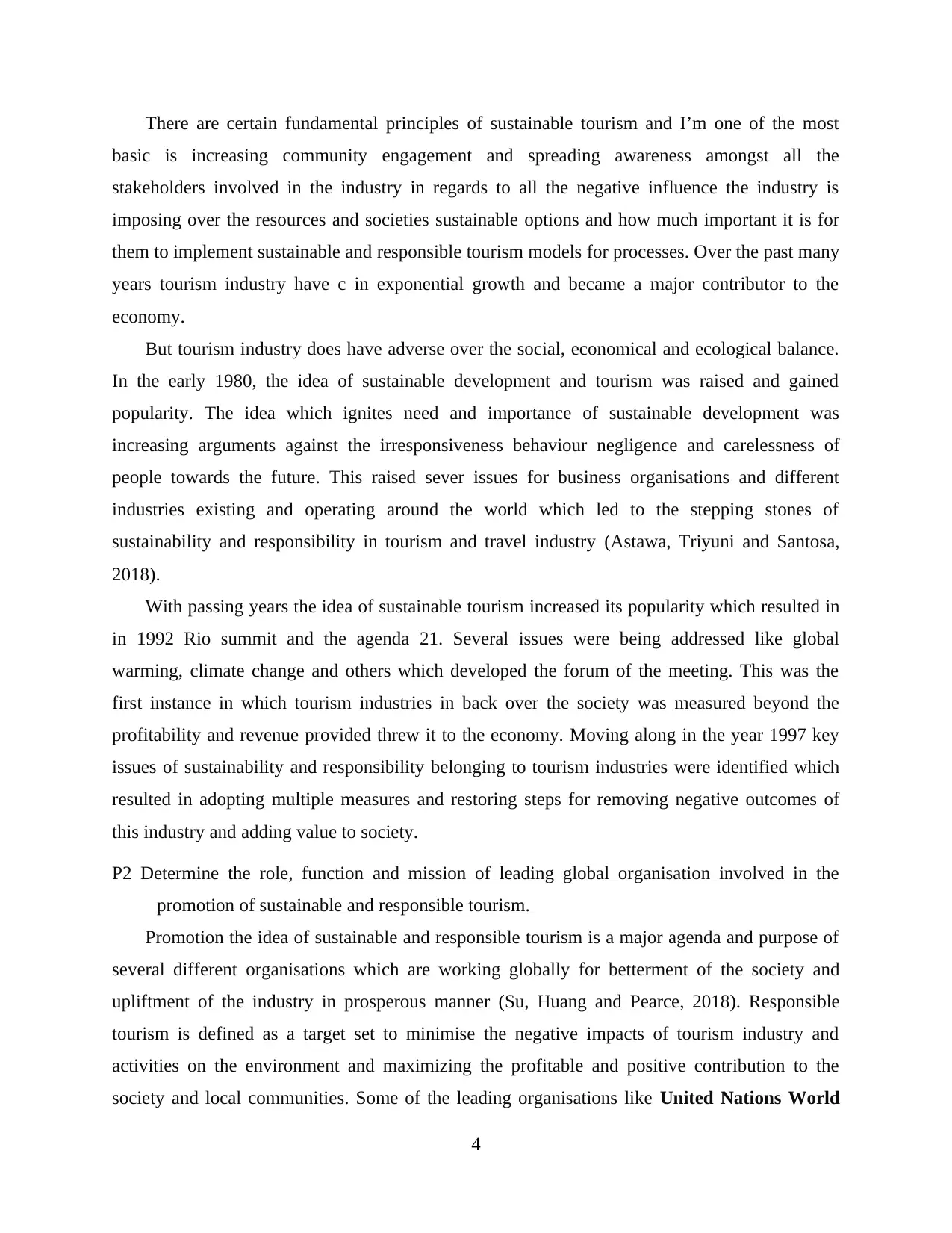
There are certain fundamental principles of sustainable tourism and I’m one of the most
basic is increasing community engagement and spreading awareness amongst all the
stakeholders involved in the industry in regards to all the negative influence the industry is
imposing over the resources and societies sustainable options and how much important it is for
them to implement sustainable and responsible tourism models for processes. Over the past many
years tourism industry have c in exponential growth and became a major contributor to the
economy.
But tourism industry does have adverse over the social, economical and ecological balance.
In the early 1980, the idea of sustainable development and tourism was raised and gained
popularity. The idea which ignites need and importance of sustainable development was
increasing arguments against the irresponsiveness behaviour negligence and carelessness of
people towards the future. This raised sever issues for business organisations and different
industries existing and operating around the world which led to the stepping stones of
sustainability and responsibility in tourism and travel industry (Astawa, Triyuni and Santosa,
2018).
With passing years the idea of sustainable tourism increased its popularity which resulted in
in 1992 Rio summit and the agenda 21. Several issues were being addressed like global
warming, climate change and others which developed the forum of the meeting. This was the
first instance in which tourism industries in back over the society was measured beyond the
profitability and revenue provided threw it to the economy. Moving along in the year 1997 key
issues of sustainability and responsibility belonging to tourism industries were identified which
resulted in adopting multiple measures and restoring steps for removing negative outcomes of
this industry and adding value to society.
P2 Determine the role, function and mission of leading global organisation involved in the
promotion of sustainable and responsible tourism.
Promotion the idea of sustainable and responsible tourism is a major agenda and purpose of
several different organisations which are working globally for betterment of the society and
upliftment of the industry in prosperous manner (Su, Huang and Pearce, 2018). Responsible
tourism is defined as a target set to minimise the negative impacts of tourism industry and
activities on the environment and maximizing the profitable and positive contribution to the
society and local communities. Some of the leading organisations like United Nations World
4
basic is increasing community engagement and spreading awareness amongst all the
stakeholders involved in the industry in regards to all the negative influence the industry is
imposing over the resources and societies sustainable options and how much important it is for
them to implement sustainable and responsible tourism models for processes. Over the past many
years tourism industry have c in exponential growth and became a major contributor to the
economy.
But tourism industry does have adverse over the social, economical and ecological balance.
In the early 1980, the idea of sustainable development and tourism was raised and gained
popularity. The idea which ignites need and importance of sustainable development was
increasing arguments against the irresponsiveness behaviour negligence and carelessness of
people towards the future. This raised sever issues for business organisations and different
industries existing and operating around the world which led to the stepping stones of
sustainability and responsibility in tourism and travel industry (Astawa, Triyuni and Santosa,
2018).
With passing years the idea of sustainable tourism increased its popularity which resulted in
in 1992 Rio summit and the agenda 21. Several issues were being addressed like global
warming, climate change and others which developed the forum of the meeting. This was the
first instance in which tourism industries in back over the society was measured beyond the
profitability and revenue provided threw it to the economy. Moving along in the year 1997 key
issues of sustainability and responsibility belonging to tourism industries were identified which
resulted in adopting multiple measures and restoring steps for removing negative outcomes of
this industry and adding value to society.
P2 Determine the role, function and mission of leading global organisation involved in the
promotion of sustainable and responsible tourism.
Promotion the idea of sustainable and responsible tourism is a major agenda and purpose of
several different organisations which are working globally for betterment of the society and
upliftment of the industry in prosperous manner (Su, Huang and Pearce, 2018). Responsible
tourism is defined as a target set to minimise the negative impacts of tourism industry and
activities on the environment and maximizing the profitable and positive contribution to the
society and local communities. Some of the leading organisations like United Nations World
4
Paraphrase This Document
Need a fresh take? Get an instant paraphrase of this document with our AI Paraphraser
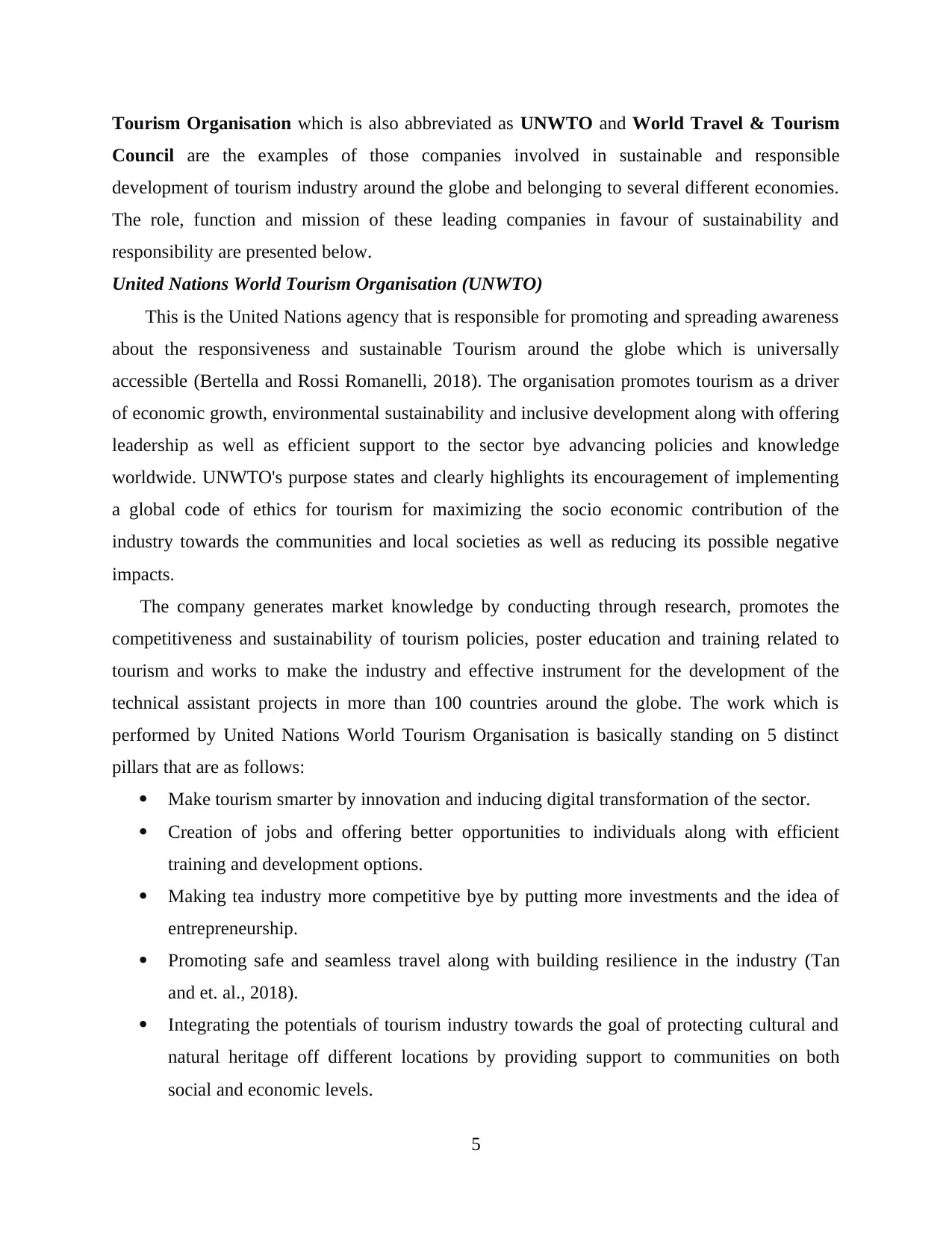
Tourism Organisation which is also abbreviated as UNWTO and World Travel & Tourism
Council are the examples of those companies involved in sustainable and responsible
development of tourism industry around the globe and belonging to several different economies.
The role, function and mission of these leading companies in favour of sustainability and
responsibility are presented below.
United Nations World Tourism Organisation (UNWTO)
This is the United Nations agency that is responsible for promoting and spreading awareness
about the responsiveness and sustainable Tourism around the globe which is universally
accessible (Bertella and Rossi Romanelli, 2018). The organisation promotes tourism as a driver
of economic growth, environmental sustainability and inclusive development along with offering
leadership as well as efficient support to the sector bye advancing policies and knowledge
worldwide. UNWTO's purpose states and clearly highlights its encouragement of implementing
a global code of ethics for tourism for maximizing the socio economic contribution of the
industry towards the communities and local societies as well as reducing its possible negative
impacts.
The company generates market knowledge by conducting through research, promotes the
competitiveness and sustainability of tourism policies, poster education and training related to
tourism and works to make the industry and effective instrument for the development of the
technical assistant projects in more than 100 countries around the globe. The work which is
performed by United Nations World Tourism Organisation is basically standing on 5 distinct
pillars that are as follows:
Make tourism smarter by innovation and inducing digital transformation of the sector.
Creation of jobs and offering better opportunities to individuals along with efficient
training and development options.
Making tea industry more competitive bye by putting more investments and the idea of
entrepreneurship.
Promoting safe and seamless travel along with building resilience in the industry (Tan
and et. al., 2018).
Integrating the potentials of tourism industry towards the goal of protecting cultural and
natural heritage off different locations by providing support to communities on both
social and economic levels.
5
Council are the examples of those companies involved in sustainable and responsible
development of tourism industry around the globe and belonging to several different economies.
The role, function and mission of these leading companies in favour of sustainability and
responsibility are presented below.
United Nations World Tourism Organisation (UNWTO)
This is the United Nations agency that is responsible for promoting and spreading awareness
about the responsiveness and sustainable Tourism around the globe which is universally
accessible (Bertella and Rossi Romanelli, 2018). The organisation promotes tourism as a driver
of economic growth, environmental sustainability and inclusive development along with offering
leadership as well as efficient support to the sector bye advancing policies and knowledge
worldwide. UNWTO's purpose states and clearly highlights its encouragement of implementing
a global code of ethics for tourism for maximizing the socio economic contribution of the
industry towards the communities and local societies as well as reducing its possible negative
impacts.
The company generates market knowledge by conducting through research, promotes the
competitiveness and sustainability of tourism policies, poster education and training related to
tourism and works to make the industry and effective instrument for the development of the
technical assistant projects in more than 100 countries around the globe. The work which is
performed by United Nations World Tourism Organisation is basically standing on 5 distinct
pillars that are as follows:
Make tourism smarter by innovation and inducing digital transformation of the sector.
Creation of jobs and offering better opportunities to individuals along with efficient
training and development options.
Making tea industry more competitive bye by putting more investments and the idea of
entrepreneurship.
Promoting safe and seamless travel along with building resilience in the industry (Tan
and et. al., 2018).
Integrating the potentials of tourism industry towards the goal of protecting cultural and
natural heritage off different locations by providing support to communities on both
social and economic levels.
5
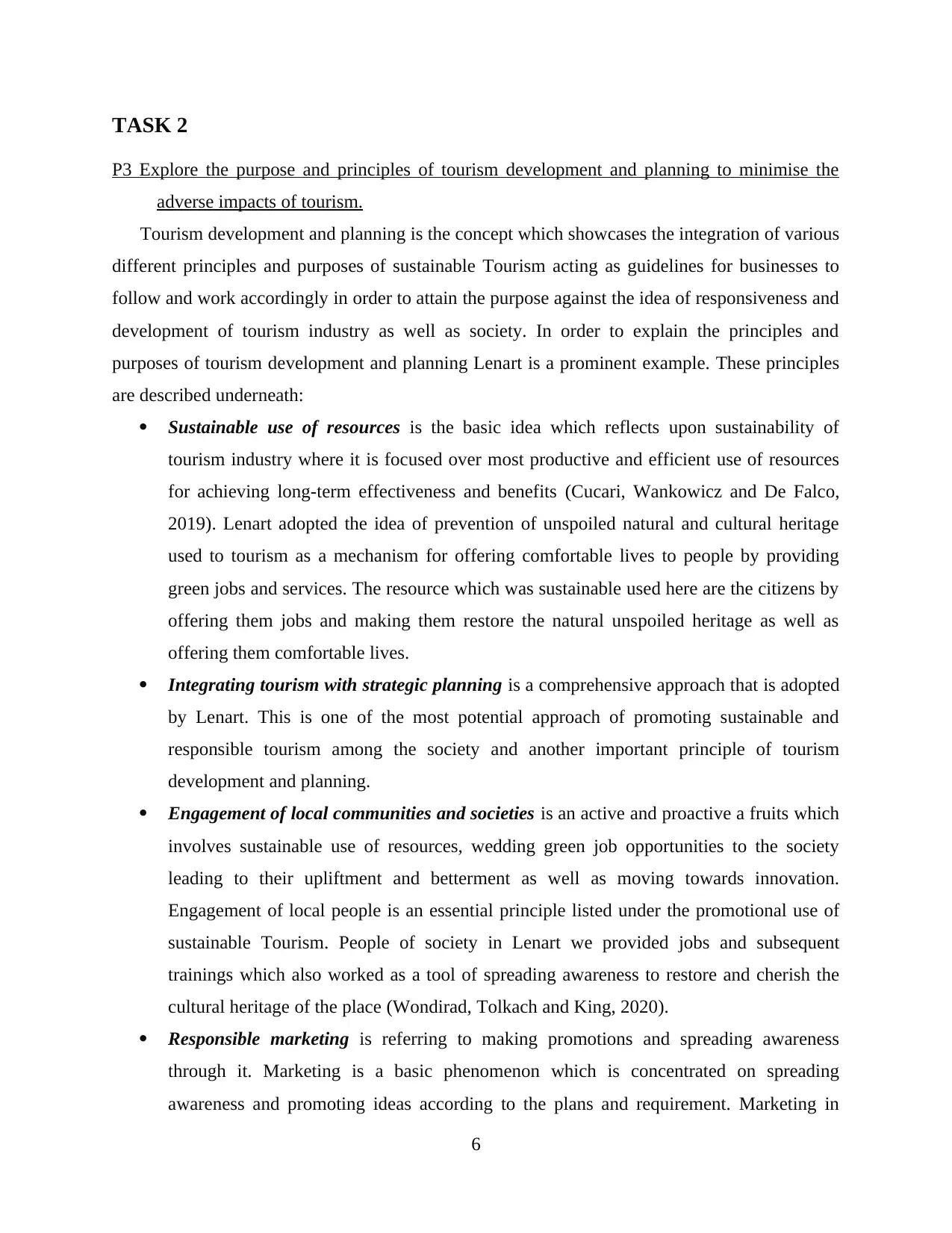
TASK 2
P3 Explore the purpose and principles of tourism development and planning to minimise the
adverse impacts of tourism.
Tourism development and planning is the concept which showcases the integration of various
different principles and purposes of sustainable Tourism acting as guidelines for businesses to
follow and work accordingly in order to attain the purpose against the idea of responsiveness and
development of tourism industry as well as society. In order to explain the principles and
purposes of tourism development and planning Lenart is a prominent example. These principles
are described underneath:
Sustainable use of resources is the basic idea which reflects upon sustainability of
tourism industry where it is focused over most productive and efficient use of resources
for achieving long-term effectiveness and benefits (Cucari, Wankowicz and De Falco,
2019). Lenart adopted the idea of prevention of unspoiled natural and cultural heritage
used to tourism as a mechanism for offering comfortable lives to people by providing
green jobs and services. The resource which was sustainable used here are the citizens by
offering them jobs and making them restore the natural unspoiled heritage as well as
offering them comfortable lives.
Integrating tourism with strategic planning is a comprehensive approach that is adopted
by Lenart. This is one of the most potential approach of promoting sustainable and
responsible tourism among the society and another important principle of tourism
development and planning.
Engagement of local communities and societies is an active and proactive a fruits which
involves sustainable use of resources, wedding green job opportunities to the society
leading to their upliftment and betterment as well as moving towards innovation.
Engagement of local people is an essential principle listed under the promotional use of
sustainable Tourism. People of society in Lenart we provided jobs and subsequent
trainings which also worked as a tool of spreading awareness to restore and cherish the
cultural heritage of the place (Wondirad, Tolkach and King, 2020).
Responsible marketing is referring to making promotions and spreading awareness
through it. Marketing is a basic phenomenon which is concentrated on spreading
awareness and promoting ideas according to the plans and requirement. Marketing in
6
P3 Explore the purpose and principles of tourism development and planning to minimise the
adverse impacts of tourism.
Tourism development and planning is the concept which showcases the integration of various
different principles and purposes of sustainable Tourism acting as guidelines for businesses to
follow and work accordingly in order to attain the purpose against the idea of responsiveness and
development of tourism industry as well as society. In order to explain the principles and
purposes of tourism development and planning Lenart is a prominent example. These principles
are described underneath:
Sustainable use of resources is the basic idea which reflects upon sustainability of
tourism industry where it is focused over most productive and efficient use of resources
for achieving long-term effectiveness and benefits (Cucari, Wankowicz and De Falco,
2019). Lenart adopted the idea of prevention of unspoiled natural and cultural heritage
used to tourism as a mechanism for offering comfortable lives to people by providing
green jobs and services. The resource which was sustainable used here are the citizens by
offering them jobs and making them restore the natural unspoiled heritage as well as
offering them comfortable lives.
Integrating tourism with strategic planning is a comprehensive approach that is adopted
by Lenart. This is one of the most potential approach of promoting sustainable and
responsible tourism among the society and another important principle of tourism
development and planning.
Engagement of local communities and societies is an active and proactive a fruits which
involves sustainable use of resources, wedding green job opportunities to the society
leading to their upliftment and betterment as well as moving towards innovation.
Engagement of local people is an essential principle listed under the promotional use of
sustainable Tourism. People of society in Lenart we provided jobs and subsequent
trainings which also worked as a tool of spreading awareness to restore and cherish the
cultural heritage of the place (Wondirad, Tolkach and King, 2020).
Responsible marketing is referring to making promotions and spreading awareness
through it. Marketing is a basic phenomenon which is concentrated on spreading
awareness and promoting ideas according to the plans and requirement. Marketing in
6
⊘ This is a preview!⊘
Do you want full access?
Subscribe today to unlock all pages.

Trusted by 1+ million students worldwide
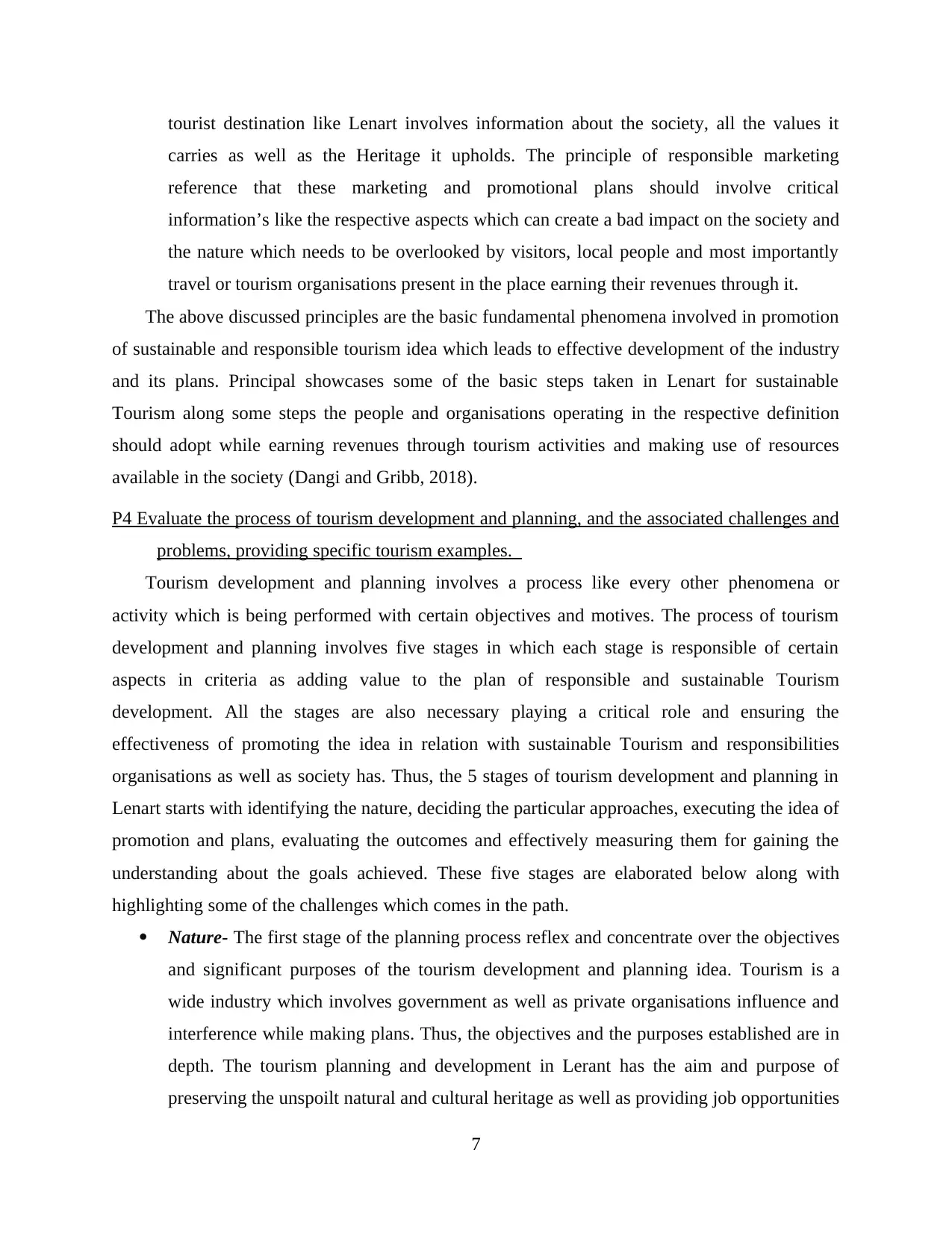
tourist destination like Lenart involves information about the society, all the values it
carries as well as the Heritage it upholds. The principle of responsible marketing
reference that these marketing and promotional plans should involve critical
information’s like the respective aspects which can create a bad impact on the society and
the nature which needs to be overlooked by visitors, local people and most importantly
travel or tourism organisations present in the place earning their revenues through it.
The above discussed principles are the basic fundamental phenomena involved in promotion
of sustainable and responsible tourism idea which leads to effective development of the industry
and its plans. Principal showcases some of the basic steps taken in Lenart for sustainable
Tourism along some steps the people and organisations operating in the respective definition
should adopt while earning revenues through tourism activities and making use of resources
available in the society (Dangi and Gribb, 2018).
P4 Evaluate the process of tourism development and planning, and the associated challenges and
problems, providing specific tourism examples.
Tourism development and planning involves a process like every other phenomena or
activity which is being performed with certain objectives and motives. The process of tourism
development and planning involves five stages in which each stage is responsible of certain
aspects in criteria as adding value to the plan of responsible and sustainable Tourism
development. All the stages are also necessary playing a critical role and ensuring the
effectiveness of promoting the idea in relation with sustainable Tourism and responsibilities
organisations as well as society has. Thus, the 5 stages of tourism development and planning in
Lenart starts with identifying the nature, deciding the particular approaches, executing the idea of
promotion and plans, evaluating the outcomes and effectively measuring them for gaining the
understanding about the goals achieved. These five stages are elaborated below along with
highlighting some of the challenges which comes in the path.
Nature- The first stage of the planning process reflex and concentrate over the objectives
and significant purposes of the tourism development and planning idea. Tourism is a
wide industry which involves government as well as private organisations influence and
interference while making plans. Thus, the objectives and the purposes established are in
depth. The tourism planning and development in Lerant has the aim and purpose of
preserving the unspoilt natural and cultural heritage as well as providing job opportunities
7
carries as well as the Heritage it upholds. The principle of responsible marketing
reference that these marketing and promotional plans should involve critical
information’s like the respective aspects which can create a bad impact on the society and
the nature which needs to be overlooked by visitors, local people and most importantly
travel or tourism organisations present in the place earning their revenues through it.
The above discussed principles are the basic fundamental phenomena involved in promotion
of sustainable and responsible tourism idea which leads to effective development of the industry
and its plans. Principal showcases some of the basic steps taken in Lenart for sustainable
Tourism along some steps the people and organisations operating in the respective definition
should adopt while earning revenues through tourism activities and making use of resources
available in the society (Dangi and Gribb, 2018).
P4 Evaluate the process of tourism development and planning, and the associated challenges and
problems, providing specific tourism examples.
Tourism development and planning involves a process like every other phenomena or
activity which is being performed with certain objectives and motives. The process of tourism
development and planning involves five stages in which each stage is responsible of certain
aspects in criteria as adding value to the plan of responsible and sustainable Tourism
development. All the stages are also necessary playing a critical role and ensuring the
effectiveness of promoting the idea in relation with sustainable Tourism and responsibilities
organisations as well as society has. Thus, the 5 stages of tourism development and planning in
Lenart starts with identifying the nature, deciding the particular approaches, executing the idea of
promotion and plans, evaluating the outcomes and effectively measuring them for gaining the
understanding about the goals achieved. These five stages are elaborated below along with
highlighting some of the challenges which comes in the path.
Nature- The first stage of the planning process reflex and concentrate over the objectives
and significant purposes of the tourism development and planning idea. Tourism is a
wide industry which involves government as well as private organisations influence and
interference while making plans. Thus, the objectives and the purposes established are in
depth. The tourism planning and development in Lerant has the aim and purpose of
preserving the unspoilt natural and cultural heritage as well as providing job opportunities
7
Paraphrase This Document
Need a fresh take? Get an instant paraphrase of this document with our AI Paraphraser
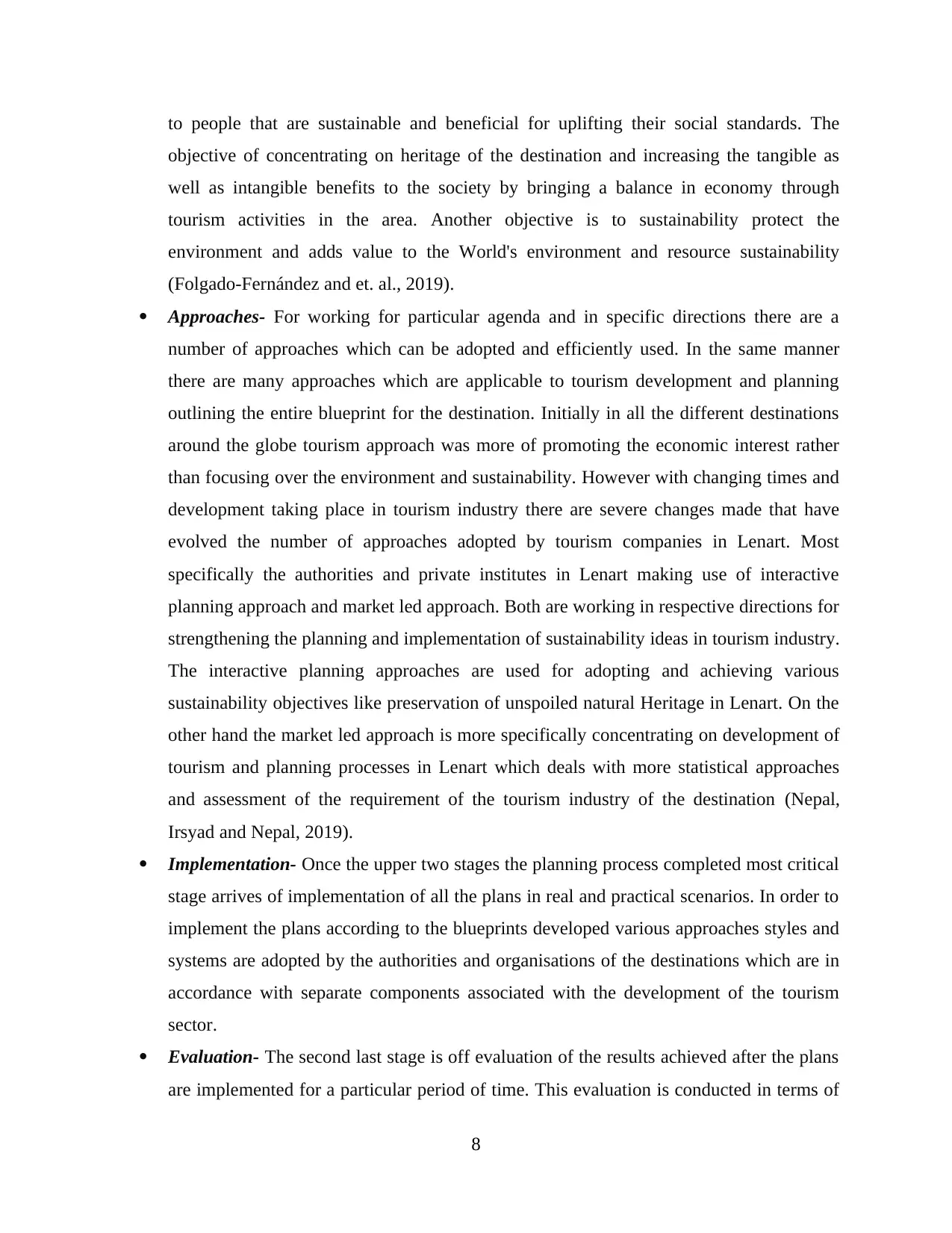
to people that are sustainable and beneficial for uplifting their social standards. The
objective of concentrating on heritage of the destination and increasing the tangible as
well as intangible benefits to the society by bringing a balance in economy through
tourism activities in the area. Another objective is to sustainability protect the
environment and adds value to the World's environment and resource sustainability
(Folgado-Fernández and et. al., 2019).
Approaches- For working for particular agenda and in specific directions there are a
number of approaches which can be adopted and efficiently used. In the same manner
there are many approaches which are applicable to tourism development and planning
outlining the entire blueprint for the destination. Initially in all the different destinations
around the globe tourism approach was more of promoting the economic interest rather
than focusing over the environment and sustainability. However with changing times and
development taking place in tourism industry there are severe changes made that have
evolved the number of approaches adopted by tourism companies in Lenart. Most
specifically the authorities and private institutes in Lenart making use of interactive
planning approach and market led approach. Both are working in respective directions for
strengthening the planning and implementation of sustainability ideas in tourism industry.
The interactive planning approaches are used for adopting and achieving various
sustainability objectives like preservation of unspoiled natural Heritage in Lenart. On the
other hand the market led approach is more specifically concentrating on development of
tourism and planning processes in Lenart which deals with more statistical approaches
and assessment of the requirement of the tourism industry of the destination (Nepal,
Irsyad and Nepal, 2019).
Implementation- Once the upper two stages the planning process completed most critical
stage arrives of implementation of all the plans in real and practical scenarios. In order to
implement the plans according to the blueprints developed various approaches styles and
systems are adopted by the authorities and organisations of the destinations which are in
accordance with separate components associated with the development of the tourism
sector.
Evaluation- The second last stage is off evaluation of the results achieved after the plans
are implemented for a particular period of time. This evaluation is conducted in terms of
8
objective of concentrating on heritage of the destination and increasing the tangible as
well as intangible benefits to the society by bringing a balance in economy through
tourism activities in the area. Another objective is to sustainability protect the
environment and adds value to the World's environment and resource sustainability
(Folgado-Fernández and et. al., 2019).
Approaches- For working for particular agenda and in specific directions there are a
number of approaches which can be adopted and efficiently used. In the same manner
there are many approaches which are applicable to tourism development and planning
outlining the entire blueprint for the destination. Initially in all the different destinations
around the globe tourism approach was more of promoting the economic interest rather
than focusing over the environment and sustainability. However with changing times and
development taking place in tourism industry there are severe changes made that have
evolved the number of approaches adopted by tourism companies in Lenart. Most
specifically the authorities and private institutes in Lenart making use of interactive
planning approach and market led approach. Both are working in respective directions for
strengthening the planning and implementation of sustainability ideas in tourism industry.
The interactive planning approaches are used for adopting and achieving various
sustainability objectives like preservation of unspoiled natural Heritage in Lenart. On the
other hand the market led approach is more specifically concentrating on development of
tourism and planning processes in Lenart which deals with more statistical approaches
and assessment of the requirement of the tourism industry of the destination (Nepal,
Irsyad and Nepal, 2019).
Implementation- Once the upper two stages the planning process completed most critical
stage arrives of implementation of all the plans in real and practical scenarios. In order to
implement the plans according to the blueprints developed various approaches styles and
systems are adopted by the authorities and organisations of the destinations which are in
accordance with separate components associated with the development of the tourism
sector.
Evaluation- The second last stage is off evaluation of the results achieved after the plans
are implemented for a particular period of time. This evaluation is conducted in terms of
8
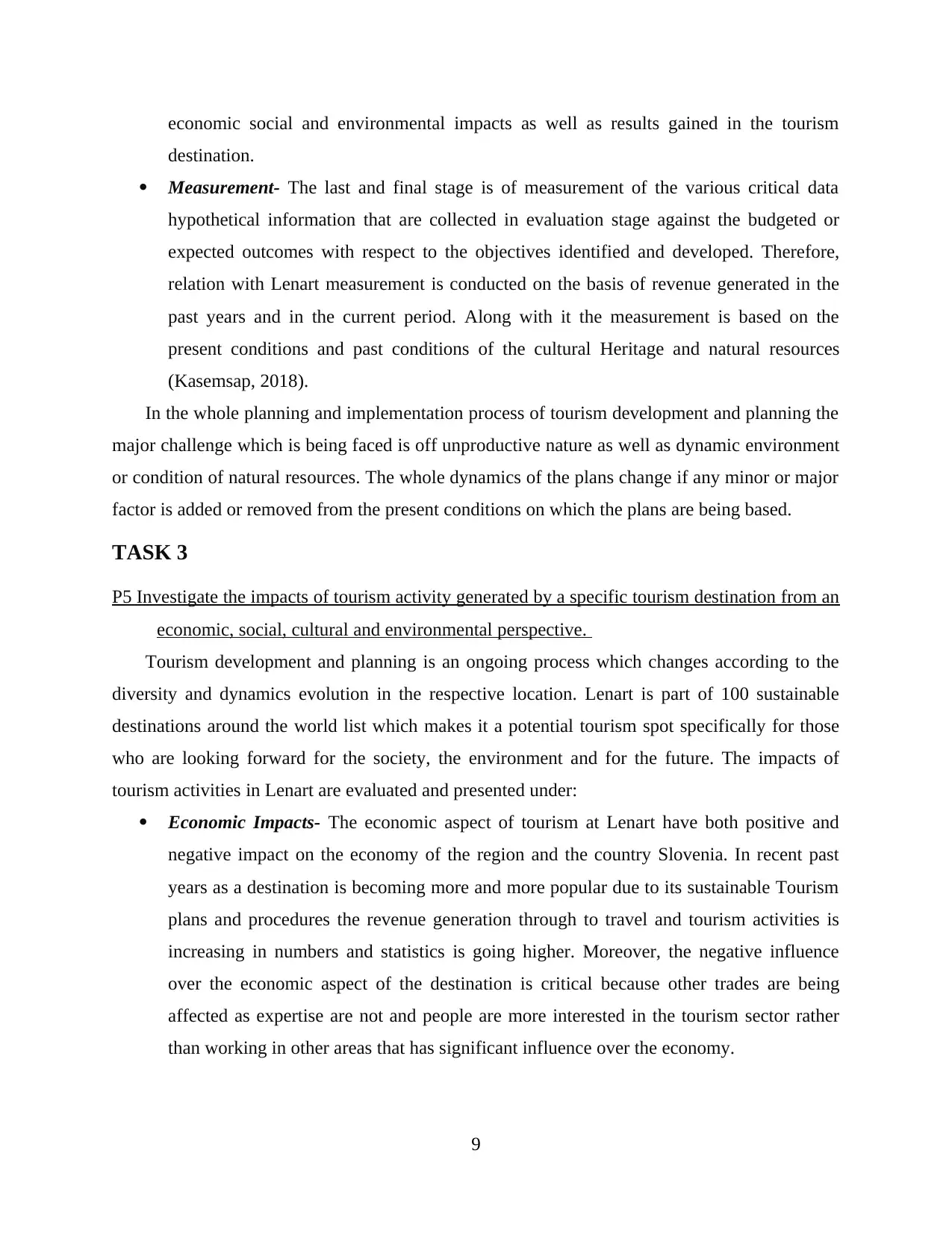
economic social and environmental impacts as well as results gained in the tourism
destination.
Measurement- The last and final stage is of measurement of the various critical data
hypothetical information that are collected in evaluation stage against the budgeted or
expected outcomes with respect to the objectives identified and developed. Therefore,
relation with Lenart measurement is conducted on the basis of revenue generated in the
past years and in the current period. Along with it the measurement is based on the
present conditions and past conditions of the cultural Heritage and natural resources
(Kasemsap, 2018).
In the whole planning and implementation process of tourism development and planning the
major challenge which is being faced is off unproductive nature as well as dynamic environment
or condition of natural resources. The whole dynamics of the plans change if any minor or major
factor is added or removed from the present conditions on which the plans are being based.
TASK 3
P5 Investigate the impacts of tourism activity generated by a specific tourism destination from an
economic, social, cultural and environmental perspective.
Tourism development and planning is an ongoing process which changes according to the
diversity and dynamics evolution in the respective location. Lenart is part of 100 sustainable
destinations around the world list which makes it a potential tourism spot specifically for those
who are looking forward for the society, the environment and for the future. The impacts of
tourism activities in Lenart are evaluated and presented under:
Economic Impacts- The economic aspect of tourism at Lenart have both positive and
negative impact on the economy of the region and the country Slovenia. In recent past
years as a destination is becoming more and more popular due to its sustainable Tourism
plans and procedures the revenue generation through to travel and tourism activities is
increasing in numbers and statistics is going higher. Moreover, the negative influence
over the economic aspect of the destination is critical because other trades are being
affected as expertise are not and people are more interested in the tourism sector rather
than working in other areas that has significant influence over the economy.
9
destination.
Measurement- The last and final stage is of measurement of the various critical data
hypothetical information that are collected in evaluation stage against the budgeted or
expected outcomes with respect to the objectives identified and developed. Therefore,
relation with Lenart measurement is conducted on the basis of revenue generated in the
past years and in the current period. Along with it the measurement is based on the
present conditions and past conditions of the cultural Heritage and natural resources
(Kasemsap, 2018).
In the whole planning and implementation process of tourism development and planning the
major challenge which is being faced is off unproductive nature as well as dynamic environment
or condition of natural resources. The whole dynamics of the plans change if any minor or major
factor is added or removed from the present conditions on which the plans are being based.
TASK 3
P5 Investigate the impacts of tourism activity generated by a specific tourism destination from an
economic, social, cultural and environmental perspective.
Tourism development and planning is an ongoing process which changes according to the
diversity and dynamics evolution in the respective location. Lenart is part of 100 sustainable
destinations around the world list which makes it a potential tourism spot specifically for those
who are looking forward for the society, the environment and for the future. The impacts of
tourism activities in Lenart are evaluated and presented under:
Economic Impacts- The economic aspect of tourism at Lenart have both positive and
negative impact on the economy of the region and the country Slovenia. In recent past
years as a destination is becoming more and more popular due to its sustainable Tourism
plans and procedures the revenue generation through to travel and tourism activities is
increasing in numbers and statistics is going higher. Moreover, the negative influence
over the economic aspect of the destination is critical because other trades are being
affected as expertise are not and people are more interested in the tourism sector rather
than working in other areas that has significant influence over the economy.
9
⊘ This is a preview!⊘
Do you want full access?
Subscribe today to unlock all pages.

Trusted by 1+ million students worldwide
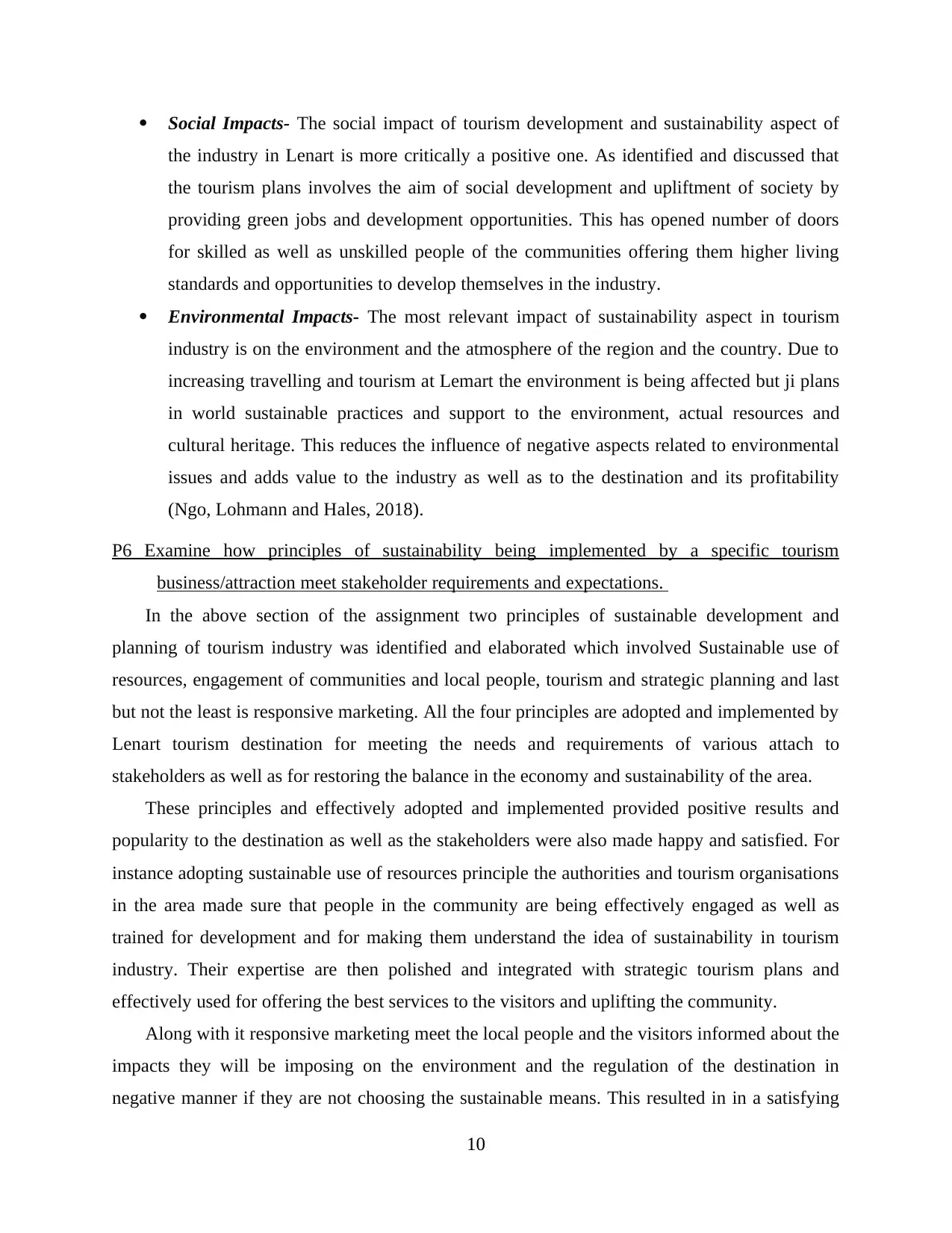
Social Impacts- The social impact of tourism development and sustainability aspect of
the industry in Lenart is more critically a positive one. As identified and discussed that
the tourism plans involves the aim of social development and upliftment of society by
providing green jobs and development opportunities. This has opened number of doors
for skilled as well as unskilled people of the communities offering them higher living
standards and opportunities to develop themselves in the industry.
Environmental Impacts- The most relevant impact of sustainability aspect in tourism
industry is on the environment and the atmosphere of the region and the country. Due to
increasing travelling and tourism at Lemart the environment is being affected but ji plans
in world sustainable practices and support to the environment, actual resources and
cultural heritage. This reduces the influence of negative aspects related to environmental
issues and adds value to the industry as well as to the destination and its profitability
(Ngo, Lohmann and Hales, 2018).
P6 Examine how principles of sustainability being implemented by a specific tourism
business/attraction meet stakeholder requirements and expectations.
In the above section of the assignment two principles of sustainable development and
planning of tourism industry was identified and elaborated which involved Sustainable use of
resources, engagement of communities and local people, tourism and strategic planning and last
but not the least is responsive marketing. All the four principles are adopted and implemented by
Lenart tourism destination for meeting the needs and requirements of various attach to
stakeholders as well as for restoring the balance in the economy and sustainability of the area.
These principles and effectively adopted and implemented provided positive results and
popularity to the destination as well as the stakeholders were also made happy and satisfied. For
instance adopting sustainable use of resources principle the authorities and tourism organisations
in the area made sure that people in the community are being effectively engaged as well as
trained for development and for making them understand the idea of sustainability in tourism
industry. Their expertise are then polished and integrated with strategic tourism plans and
effectively used for offering the best services to the visitors and uplifting the community.
Along with it responsive marketing meet the local people and the visitors informed about the
impacts they will be imposing on the environment and the regulation of the destination in
negative manner if they are not choosing the sustainable means. This resulted in in a satisfying
10
the industry in Lenart is more critically a positive one. As identified and discussed that
the tourism plans involves the aim of social development and upliftment of society by
providing green jobs and development opportunities. This has opened number of doors
for skilled as well as unskilled people of the communities offering them higher living
standards and opportunities to develop themselves in the industry.
Environmental Impacts- The most relevant impact of sustainability aspect in tourism
industry is on the environment and the atmosphere of the region and the country. Due to
increasing travelling and tourism at Lemart the environment is being affected but ji plans
in world sustainable practices and support to the environment, actual resources and
cultural heritage. This reduces the influence of negative aspects related to environmental
issues and adds value to the industry as well as to the destination and its profitability
(Ngo, Lohmann and Hales, 2018).
P6 Examine how principles of sustainability being implemented by a specific tourism
business/attraction meet stakeholder requirements and expectations.
In the above section of the assignment two principles of sustainable development and
planning of tourism industry was identified and elaborated which involved Sustainable use of
resources, engagement of communities and local people, tourism and strategic planning and last
but not the least is responsive marketing. All the four principles are adopted and implemented by
Lenart tourism destination for meeting the needs and requirements of various attach to
stakeholders as well as for restoring the balance in the economy and sustainability of the area.
These principles and effectively adopted and implemented provided positive results and
popularity to the destination as well as the stakeholders were also made happy and satisfied. For
instance adopting sustainable use of resources principle the authorities and tourism organisations
in the area made sure that people in the community are being effectively engaged as well as
trained for development and for making them understand the idea of sustainability in tourism
industry. Their expertise are then polished and integrated with strategic tourism plans and
effectively used for offering the best services to the visitors and uplifting the community.
Along with it responsive marketing meet the local people and the visitors informed about the
impacts they will be imposing on the environment and the regulation of the destination in
negative manner if they are not choosing the sustainable means. This resulted in in a satisfying
10
Paraphrase This Document
Need a fresh take? Get an instant paraphrase of this document with our AI Paraphraser
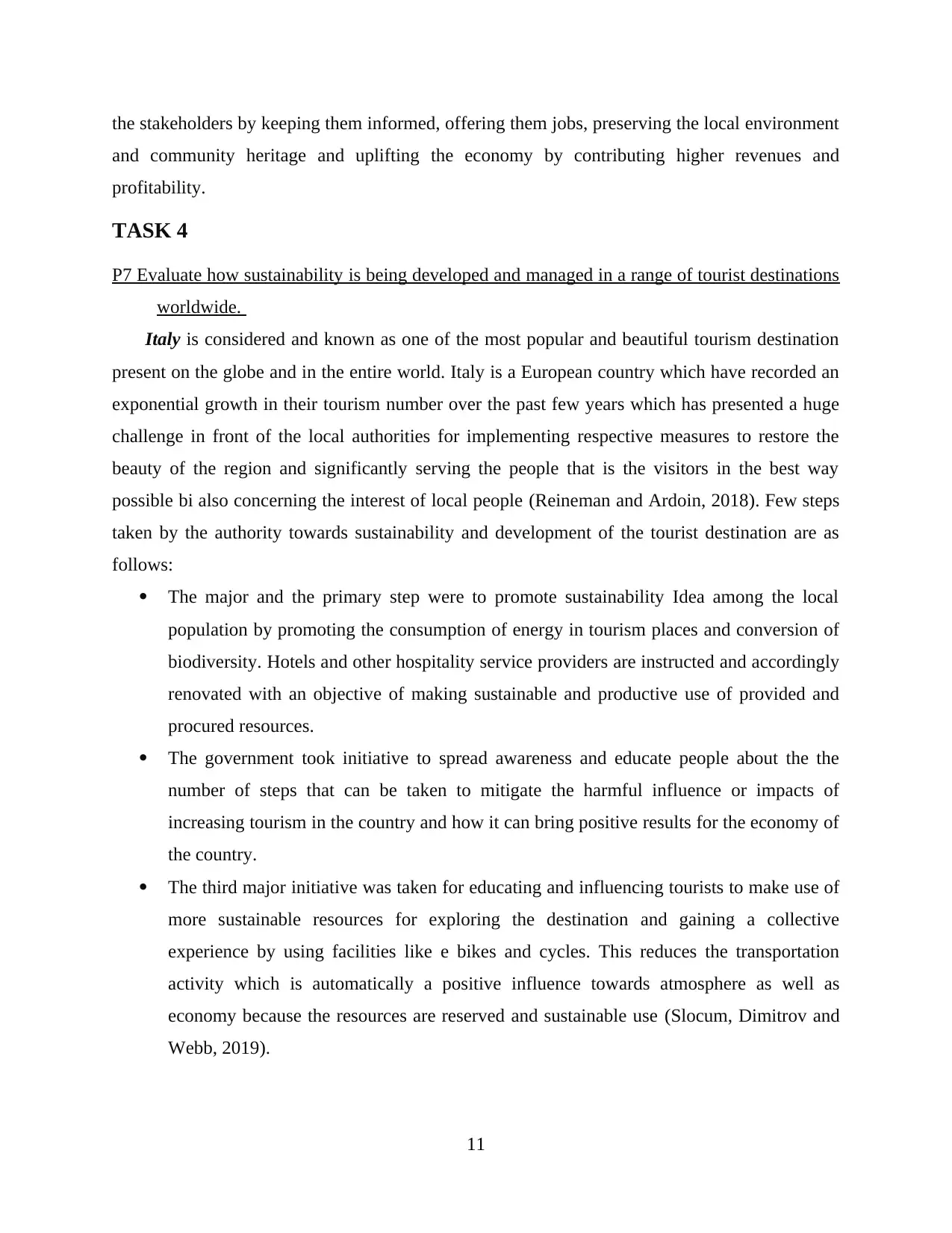
the stakeholders by keeping them informed, offering them jobs, preserving the local environment
and community heritage and uplifting the economy by contributing higher revenues and
profitability.
TASK 4
P7 Evaluate how sustainability is being developed and managed in a range of tourist destinations
worldwide.
Italy is considered and known as one of the most popular and beautiful tourism destination
present on the globe and in the entire world. Italy is a European country which have recorded an
exponential growth in their tourism number over the past few years which has presented a huge
challenge in front of the local authorities for implementing respective measures to restore the
beauty of the region and significantly serving the people that is the visitors in the best way
possible bi also concerning the interest of local people (Reineman and Ardoin, 2018). Few steps
taken by the authority towards sustainability and development of the tourist destination are as
follows:
The major and the primary step were to promote sustainability Idea among the local
population by promoting the consumption of energy in tourism places and conversion of
biodiversity. Hotels and other hospitality service providers are instructed and accordingly
renovated with an objective of making sustainable and productive use of provided and
procured resources.
The government took initiative to spread awareness and educate people about the the
number of steps that can be taken to mitigate the harmful influence or impacts of
increasing tourism in the country and how it can bring positive results for the economy of
the country.
The third major initiative was taken for educating and influencing tourists to make use of
more sustainable resources for exploring the destination and gaining a collective
experience by using facilities like e bikes and cycles. This reduces the transportation
activity which is automatically a positive influence towards atmosphere as well as
economy because the resources are reserved and sustainable use (Slocum, Dimitrov and
Webb, 2019).
11
and community heritage and uplifting the economy by contributing higher revenues and
profitability.
TASK 4
P7 Evaluate how sustainability is being developed and managed in a range of tourist destinations
worldwide.
Italy is considered and known as one of the most popular and beautiful tourism destination
present on the globe and in the entire world. Italy is a European country which have recorded an
exponential growth in their tourism number over the past few years which has presented a huge
challenge in front of the local authorities for implementing respective measures to restore the
beauty of the region and significantly serving the people that is the visitors in the best way
possible bi also concerning the interest of local people (Reineman and Ardoin, 2018). Few steps
taken by the authority towards sustainability and development of the tourist destination are as
follows:
The major and the primary step were to promote sustainability Idea among the local
population by promoting the consumption of energy in tourism places and conversion of
biodiversity. Hotels and other hospitality service providers are instructed and accordingly
renovated with an objective of making sustainable and productive use of provided and
procured resources.
The government took initiative to spread awareness and educate people about the the
number of steps that can be taken to mitigate the harmful influence or impacts of
increasing tourism in the country and how it can bring positive results for the economy of
the country.
The third major initiative was taken for educating and influencing tourists to make use of
more sustainable resources for exploring the destination and gaining a collective
experience by using facilities like e bikes and cycles. This reduces the transportation
activity which is automatically a positive influence towards atmosphere as well as
economy because the resources are reserved and sustainable use (Slocum, Dimitrov and
Webb, 2019).
11
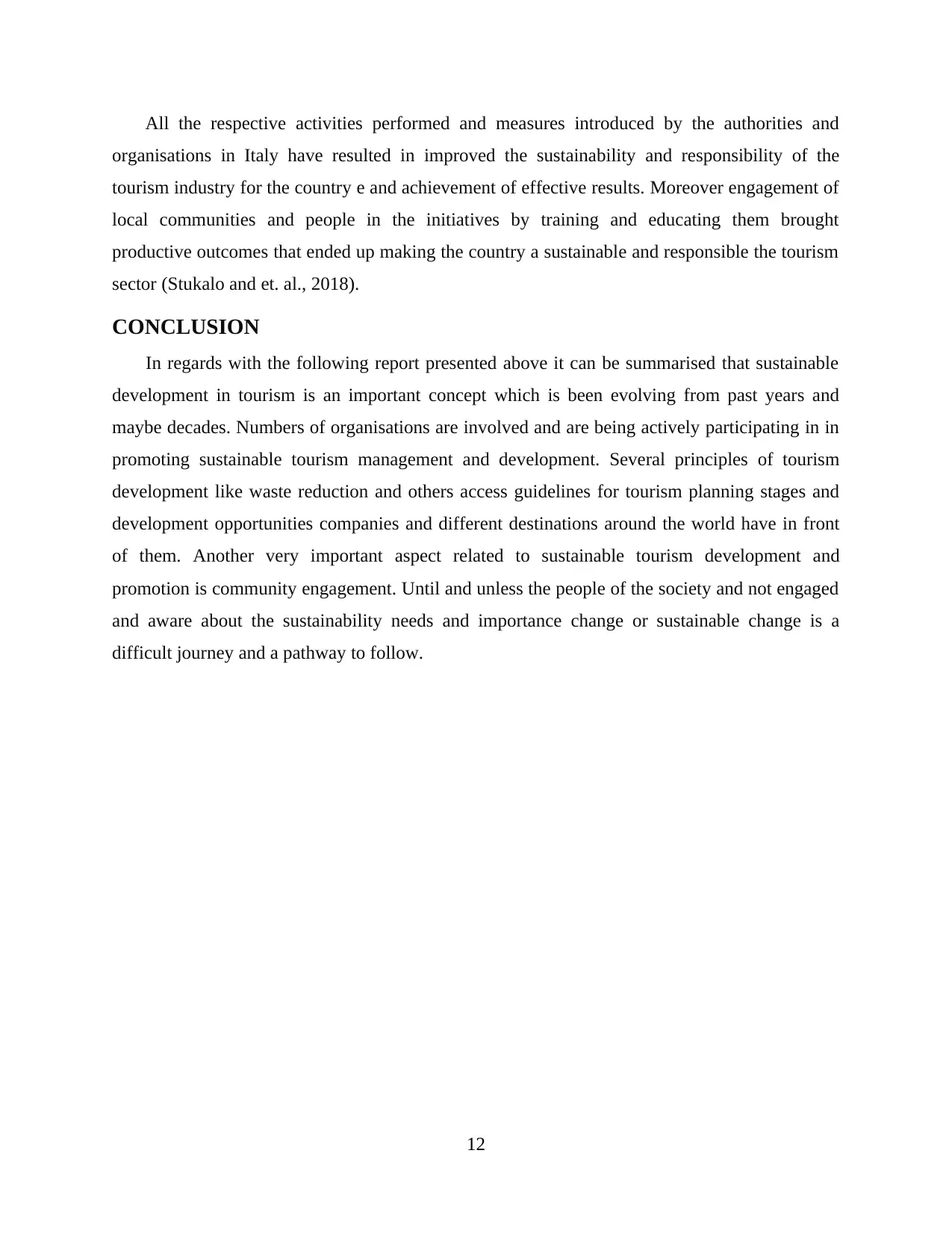
All the respective activities performed and measures introduced by the authorities and
organisations in Italy have resulted in improved the sustainability and responsibility of the
tourism industry for the country e and achievement of effective results. Moreover engagement of
local communities and people in the initiatives by training and educating them brought
productive outcomes that ended up making the country a sustainable and responsible the tourism
sector (Stukalo and et. al., 2018).
CONCLUSION
In regards with the following report presented above it can be summarised that sustainable
development in tourism is an important concept which is been evolving from past years and
maybe decades. Numbers of organisations are involved and are being actively participating in in
promoting sustainable tourism management and development. Several principles of tourism
development like waste reduction and others access guidelines for tourism planning stages and
development opportunities companies and different destinations around the world have in front
of them. Another very important aspect related to sustainable tourism development and
promotion is community engagement. Until and unless the people of the society and not engaged
and aware about the sustainability needs and importance change or sustainable change is a
difficult journey and a pathway to follow.
12
organisations in Italy have resulted in improved the sustainability and responsibility of the
tourism industry for the country e and achievement of effective results. Moreover engagement of
local communities and people in the initiatives by training and educating them brought
productive outcomes that ended up making the country a sustainable and responsible the tourism
sector (Stukalo and et. al., 2018).
CONCLUSION
In regards with the following report presented above it can be summarised that sustainable
development in tourism is an important concept which is been evolving from past years and
maybe decades. Numbers of organisations are involved and are being actively participating in in
promoting sustainable tourism management and development. Several principles of tourism
development like waste reduction and others access guidelines for tourism planning stages and
development opportunities companies and different destinations around the world have in front
of them. Another very important aspect related to sustainable tourism development and
promotion is community engagement. Until and unless the people of the society and not engaged
and aware about the sustainability needs and importance change or sustainable change is a
difficult journey and a pathway to follow.
12
⊘ This is a preview!⊘
Do you want full access?
Subscribe today to unlock all pages.

Trusted by 1+ million students worldwide
1 out of 14
Related Documents
Your All-in-One AI-Powered Toolkit for Academic Success.
+13062052269
info@desklib.com
Available 24*7 on WhatsApp / Email
![[object Object]](/_next/static/media/star-bottom.7253800d.svg)
Unlock your academic potential
Copyright © 2020–2026 A2Z Services. All Rights Reserved. Developed and managed by ZUCOL.





